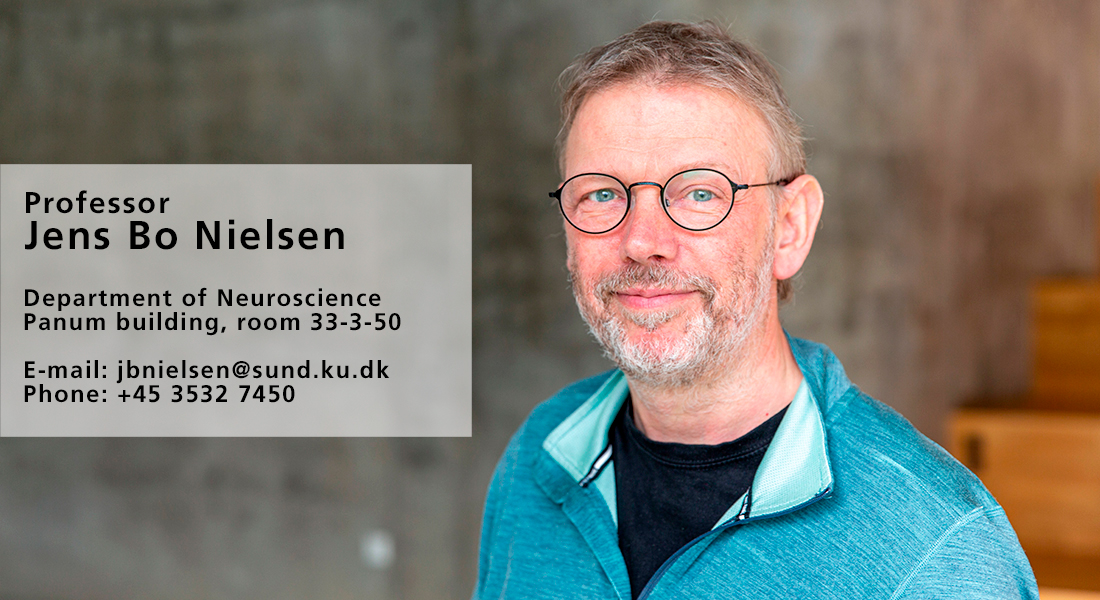Nielsen Lab
The Nielsen lab aims to gain insight in basic principles and mechanisms of motor learning, the neuroplastic changes in the central nervous system (CNS) underlying motor learning and the relationship between neuroplasticity and behavioral changes.
The synergistic interplay between fundamental neuroscience, clinical neurology, and neurohabilitation plays a pivotal role in enhancing therapeutic interventions for neurological disorders and advancing novel methodologies in neurorehabilitation. The Nielsen laboratory is committed to bridging the gap between fundamental animal neuroscience and clinical neurology by undertaking non-invasive electrophysiological and imaging investigations in both healthy human subjects and individuals afflicted by neurological disorders. These endeavors are founded on insights gleaned from foundational animal neuroscience investigations.
The Nielsen lab places significant emphasis on nurturing close collaborations, both with units engaged in fundamental animal neuroscience research and with clinical neurological departments and neurorehabilitation centers. This collaborative approach constitutes a cornerstone of the Nielsen lab's mission and activities.
A central focus of the Nielsen lab revolves around unraveling the spinal and cortical mechanisms underpinning human bipedal walking and scrutinizing parallels or distinctions from animal quadrupedal locomotion. This knowledge is pivotal in shaping investigations into the pathophysiology of gait disorders and disabilities within neurological populations, while also driving the creation of innovative therapeutic strategies aimed at enhancing gait ability and recovery of gait impairments following central nervous system injuries and disorders.
The Nielsen lab aims to attain a profound understanding of core principles and mechanisms governing motor learning, the neuroplastic alterations within the central nervous system (CNS) that underlie motor learning, and the intricate interplay between neuroplasticity and behavioral modifications. This knowledge is harnessed to optimize the design of motor training and rehabilitation approaches.
Furthermore, in collaboration with the Elsass Foundation, the Nielsen lab endeavors to gain comprehensive insights into the developing brain and the adaptations that manifest in response to early brain lesions. Grounded in this knowledge, the lab strives to devise novel avenues for enhancing the quality of life for both pediatric and adult populations affected by cerebral palsy (CP). This mission encompasses the formulation and validation of new interventions, therapies, and technological solutions.
- Spedden ME, Beck MM, West TO, Farmer SF, Nielsen JB, Lundbye-Jensen J. Dynamics of cortical and corticomuscular connectivity during planning and execution of visually guided steps in humans. Cereb Cortex. 2022 Mar 3:bhac066.
- Nielsen JB. Human Spinal Motor Control. Annu Rev Neurosci. 2016;39:81-101
- Willerslev-Olsen M, Petersen TH, Farmer SF, Nielsen JB. Gait training facilitates central drive to ankle dorsiflexors in children with cerebral palsy. Brain. 2015; 138(Pt 3):589-603.
- Choi JT, Bouyer LJ, Nielsen JB. Disruption of Locomotor Adaptation with Repetitive Transcranial Magnetic Stimulation Over the Motor Cortex. Cereb Cortex. 2015; 25(7):1981-6.
- Petersen TH, Willerslev-Olsen M, Conway BA, Nielsen JB. The motor cortex drives the muscles during walking in human subjects. J Physiol. 2012;590(Pt 10):2443-52.
- Roig M, Nordbrandt S, Geertsen SS, <strong>Nielsen JB. The effects of cardiovascular exercise on human memory: A review with meta-analysis. Neurosci Biobehav Rev. 2013; 37(8):1645-1666
- Transcranial magnetic stimulation (TMS) is used to induce plasticity and create perturbations of the central nervous system as well as to probe the plasticity of the cortico-spinal system.
- Electroencephalography (EEG) is used to monitor brain activity during motor activities as well as in response to sensory stimulation. In addition, EEG is used to test hypotheses concerning network interactions in the brain.
- 3-D motion analysis is used for kinematic analysis of movements; e.g. gait
- Eye-tracking is used to monitor eye movements.
- Functional magnetic resonance imaging (fMRI), is used collaboration with Danish Research Centre for Magnetic Resonance at Hvidovre Hospital to study brain activity during sensorimotor interaction tasks.
- Behavioral tests are used to induce appropriate sensorimotor interactions. We both use conventional behavioral tests and develop many of the tasks ourselves in collaboration with programmers or lab-technicians.
Lab members
| Name | Title | Job responsibilities | |
|---|---|---|---|
| Search in Name | Search in Title | Search in Job responsibilities | |
| Anina Ritterband-Rosenbaum | Guest Researcher | Nielsen lab |
|
| Erik Bruun Simonsen | Guest Researcher | Nielsen Lab |
|
| Frederik H Dornonville de la Cour | Postdoc | Nielsen lab |
|
| Hans Hultborn | Professor Emeritus | Nielsen Lab |
|
| Helle Marie Hüche Larsen | Postdoc | Nielsen Lab |
|
| Jens Bo Nielsen | Professor | Nielsen lab |
|
| Jesper Dybdal Kayser | PhD Student | Nielsen Lab |
|
| Judith Tierno Martí | Research Assistant | Nielsen Lab |
|
| Lisbeth Højkjær Larsen | Postdoc | Nielsen Lab |
|
| Maria Willerslev-Olsen | Guest Researcher | Nielsen lab |
|
| Mikkel Damgaard Justiniano | Guest Researcher | Nielsen Lab |
|
| Mohamad Barad | Guest Researcher | Nielsen Lab |
|
| Morten Freiesleben | Guest Researcher | Nielsen Lab |
|
| Pernille Ulrik Kaster | Guest Researcher | Nielsen Lab |
|
| Rasmus Feld Frisk | Associate Professor | Nielsen lab |
|
| Sabrina Elisabeth Schnell | PhD Fellow | Nielsen Lab |
|
| Tony Biakceunung Rungling | External, Ph.d Student | Nielsen Lab |
|

